Let's Compare Saltwater, Mineral, Chlorinated & Freshwater Fibreglass Pools
When it comes to choosing the perfect pool for your home, the options can be overwhelming. From saltwater to mineral, chlorinated to freshwater, each pool type offers unique benefits and challenges. Understanding these differences is crucial for homeowners and pool owners alike. This blog post aims to provide a comprehensive comparison of saltwater, mineral, chlorinated, and freshwater fibreglass pools. By the end, you'll have a clear understanding of which pool type best fits your needs, lifestyle, and budget.
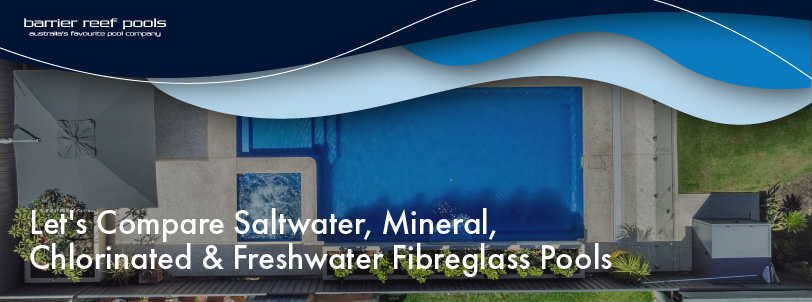
Understanding the Basics
Saltwater Pools
Saltwater pools use a salt chlorine generator to produce chlorine from salt added to the water. This method reduces the need for traditional chlorine products, making it a more sustainable option for pool owners. Maintenance involves regularly checking and adjusting salt levels and occasionally cleaning the generator cell to ensure it functions efficiently. The gentle, softer water of saltwater pools is less harsh on skin and eyes, making it a more comfortable experience for swimmers. Additionally, the reduced chlorine smell is appreciated by many.
Mineral Pools
Mineral pools are similar to saltwater pools but add minerals like magnesium, potassium, and calcium to the mix. These minerals not only help maintain water quality but also provide therapeutic benefits. These pools use a mineral chlorinator to maintain water quality. Maintenance includes checking mineral levels, replacing cartridges as needed, and ensuring the water balance is correct. The therapeutic benefits of mineral pools are often touted, including improved skin hydration, enhanced relaxation, and muscle recovery. Swimmers often report a more soothing and rejuvenating experience compared to traditional pools.
Chlorinated Pools
Chlorinated pools are the most traditional and common type of swimming pools. They rely on adding chlorine directly to the water to maintain cleanliness and prevent the growth of algae and bacteria. Regular maintenance involves testing and adjusting chlorine levels, as well as shocking the pool periodically to eliminate contaminants and ensure the water remains clear and safe for swimmers. While chlorinated pools are effective at keeping water clear and sanitary, the chemicals can be harsher on skin and swimwear, sometimes causing irritation or fading. Proper balancing of pH levels is crucial to mitigate these effects.
Freshwater Pools
While less common, freshwater pools offer a unique swimming experience by using advanced filtration systems to keep water clean without the need for added chemicals. These systems often employ a combination of UV light, ozone, and natural filtration materials to maintain water quality. Maintenance involves regular cleaning and frequent filter replacement to ensure the system operates effectively. Freshwater pools offer a more natural swimming experience, with water that feels softer and is free from chemical odours. However, they require more frequent filter maintenance to ensure the water remains pristine, making them a bit more labour-intensive compared to other types.
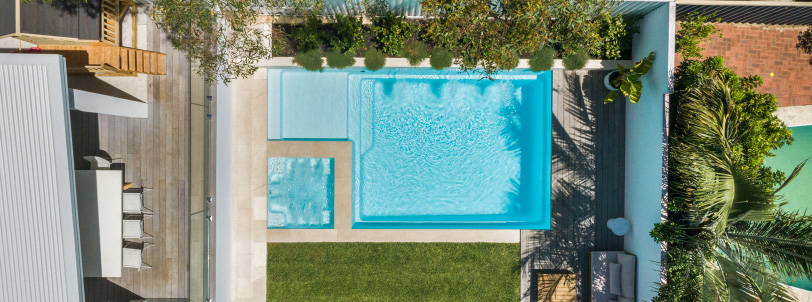
Cost Analysis
Initial Installation Costs
- Saltwater Pools: Installation costs are generally higher due to specialised equipment. Expect to invest significantly more than a traditional chlorinated pool.
- Mineral Pools: Similar to saltwater pools, these require additional equipment, adding to the initial costs. Installation may run higher than chlorinated pools.
- Chlorinated Pools: These pools have the lowest initial installation costs since they don’t require specialised equipment.
- Freshwater Pools: Costs can vary widely depending on the filtration system. Initial investment might be slightly higher due to advanced filters.
Long-Term Maintenance Expenses
- Saltwater Pools: Lower ongoing costs for chlorine, but occasional replacement of the generator cell can be pricey.
- Mineral Pools: Similar long-term costs to saltwater pools, with periodic expenses for mineral replacements.
- Chlorinated Pools: Higher ongoing costs for chlorine and chemicals.
Freshwater Pools: Filter replacement costs can vary annually.
Environmental Impact
Water Consumption
- Saltwater Pools: Lower water consumption due to reduced need for backwashing. Saltwater systems help maintain water levels.
- Mineral Pools: Similar to saltwater pools with efficient water usage. The addition of minerals does not significantly affect water consumption.
- Chlorinated Pools: Higher water consumption due to frequent backwashing and topping up of water levels.
- Freshwater Pools: Typically use the least water, as advanced filtration systems minimise water loss.
Energy Use
- Saltwater Pools: Moderate energy use due to the salt chlorine generator’s power requirements.
- Mineral Pools: Similar energy use to saltwater pools since both systems utilise chlorinators.
- Chlorinated Pools: Lower energy use as there is no need for a generator, just circulation and filtration systems.
- Freshwater Pools: Dependent on the type of filtration system, but advanced filters can consume more energy.
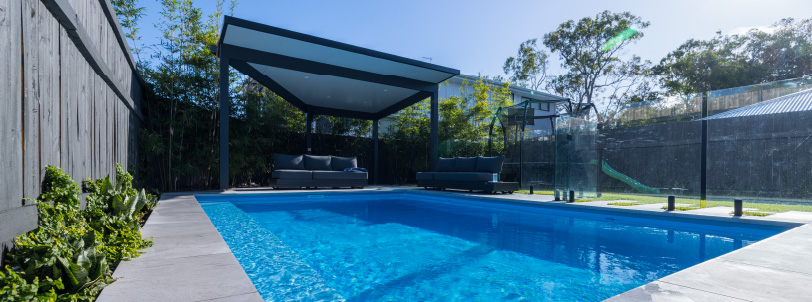
Health and Safety
Skin and Eye Irritation
- Saltwater Pools: Generally gentler on the skin and eyes, reducing irritation compared to chlorinated pools.
- Mineral Pools: Known for their therapeutic benefits, mineral pools can help soothe skin conditions and relax muscles.
- Chlorinated Pools: Traditional chlorine can cause skin and eye irritation, especially if levels are not correctly maintained.
- Freshwater Pools: Often the best for avoiding irritation, as there are no added chemicals in the water.
Health Benefits
- Saltwater Pools: May help alleviate skin conditions like eczema due to the lower chlorine levels.
- Mineral Pools: The magnesium and potassium in the water can benefit overall skin health and muscle relaxation.
- Chlorinated Pools: Effective at killing bacteria and pathogens, ensuring a safe swimming environment.
- Freshwater Pools: Offer a natural swimming experience, reducing exposure to chemicals and potential allergens.
Aesthetics and Customisation
Visual Appeal
- Saltwater Pools: Crystal-clear water with a natural look, enhanced by gentle blue-green hues.
- Mineral Pools: Similar to saltwater pools, with the added aesthetic appeal of luxurious mineral-infused water.
- Chlorinated Pools: Clear and inviting, though the water can sometimes appear harsh due to high chlorine levels.
- Freshwater Pools: Pristine and natural, these pools offer a refreshing, chemical-free appearance.
Customization Options
- Saltwater Pools: Compatible with various designs and features, including waterfalls and LED lighting.
- Mineral Pools: Allow for similar customisations as saltwater pools, making them versatile for different styles.
- Chlorinated Pools: Highly customisable, from shapes and sizes to additional features like slides or diving boards.
- Freshwater Pools: Customisable but may require specific filtration systems to accommodate certain designs.
Conclusion
Choosing the right pool type for your home involves considering various factors, from cost and maintenance to environmental impact and health benefits. Saltwater pools offer a gentle and low-maintenance option, while mineral pools provide therapeutic advantages. Chlorinated pools are effective and cost-efficient but can be harsher on the skin and eyes. Freshwater pools provide the most natural experience but require advanced filtration systems.
Ultimately, the best pool type depends on your specific needs, preferences, and budget. For those looking to invest in their home’s outdoor oasis, understanding these differences is the first step towards making an informed decision.
Let's Compare Saltwater, Mineral, Chlorinated & Freshwater Fibreglass Pools
When it comes to choosing the perfect pool for your home, the options can be overwhelming. From saltwater to mineral, chlorinated to freshwater, each pool type offers unique benefits and challenges. Understanding these differences is crucial for homeowners and pool owners alike. This blog post aims to provide a comprehensive comparison of saltwater, mineral, chlorinated, and freshwater fibreglass pools. By the end, you'll have a clear understanding of which pool type best fits your needs, lifestyle, and budget.
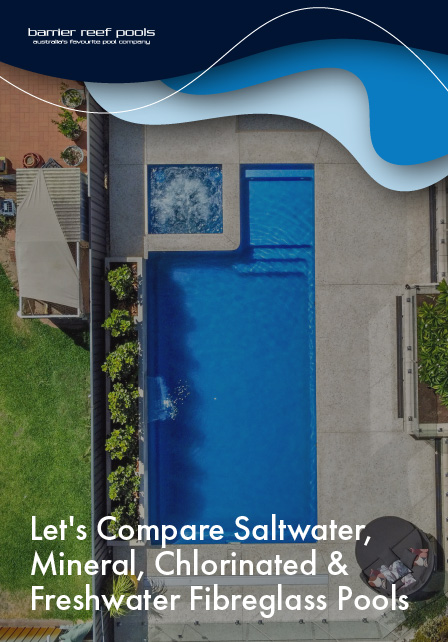
Understanding the Basics
Saltwater Pools
Saltwater pools use a salt chlorine generator to produce chlorine from salt added to the water. This method reduces the need for traditional chlorine products, making it a more sustainable option for pool owners. Maintenance involves regularly checking and adjusting salt levels and occasionally cleaning the generator cell to ensure it functions efficiently. The gentle, softer water of saltwater pools is less harsh on skin and eyes, making it a more comfortable experience for swimmers. Additionally, the reduced chlorine smell is appreciated by many.
Mineral Pools
Mineral pools are similar to saltwater pools but add minerals like magnesium, potassium, and calcium to the mix. These minerals not only help maintain water quality but also provide therapeutic benefits. These pools use a mineral chlorinator to maintain water quality. Maintenance includes checking mineral levels, replacing cartridges as needed, and ensuring the water balance is correct. The therapeutic benefits of mineral pools are often touted, including improved skin hydration, enhanced relaxation, and muscle recovery. Swimmers often report a more soothing and rejuvenating experience compared to traditional pools.
Chlorinated Pools
Chlorinated pools are the most traditional and common type of swimming pools. They rely on adding chlorine directly to the water to maintain cleanliness and prevent the growth of algae and bacteria. Regular maintenance involves testing and adjusting chlorine levels, as well as shocking the pool periodically to eliminate contaminants and ensure the water remains clear and safe for swimmers. While chlorinated pools are effective at keeping water clear and sanitary, the chemicals can be harsher on skin and swimwear, sometimes causing irritation or fading. Proper balancing of pH levels is crucial to mitigate these effects.
Freshwater Pools
While less common, freshwater pools offer a unique swimming experience by using advanced filtration systems to keep water clean without the need for added chemicals. These systems often employ a combination of UV light, ozone, and natural filtration materials to maintain water quality. Maintenance involves regular cleaning and frequent filter replacement to ensure the system operates effectively. Freshwater pools offer a more natural swimming experience, with water that feels softer and is free from chemical odours. However, they require more frequent filter maintenance to ensure the water remains pristine, making them a bit more labour-intensive compared to other types.
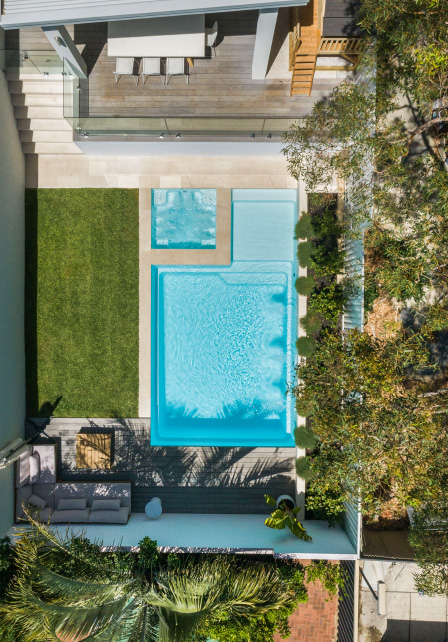
Cost Analysis
Initial Installation Costs
- Saltwater Pools: Installation costs are generally higher due to specialised equipment. Expect to invest significantly more than a traditional chlorinated pool.
- Mineral Pools: Similar to saltwater pools, these require additional equipment, adding to the initial costs. Installation may run higher than chlorinated pools.
- Chlorinated Pools: These pools have the lowest initial installation costs since they don’t require specialised equipment.
- Freshwater Pools: Costs can vary widely depending on the filtration system. Initial investment might be slightly higher due to advanced filters.
Long-Term Maintenance Expenses
- Saltwater Pools: Lower ongoing costs for chlorine, but occasional replacement of the generator cell can be pricey.
- Mineral Pools: Similar long-term costs to saltwater pools, with periodic expenses for mineral replacements.
- Chlorinated Pools: Higher ongoing costs for chlorine and chemicals.
Freshwater Pools: Filter replacement costs can vary annually.
Environmental Impact
Water Consumption
- Saltwater Pools: Lower water consumption due to reduced need for backwashing. Saltwater systems help maintain water levels.
- Mineral Pools: Similar to saltwater pools with efficient water usage. The addition of minerals does not significantly affect water consumption.
- Chlorinated Pools: Higher water consumption due to frequent backwashing and topping up of water levels.
- Freshwater Pools: Typically use the least water, as advanced filtration systems minimise water loss.
Energy Use
- Saltwater Pools: Moderate energy use due to the salt chlorine generator’s power requirements.
- Mineral Pools: Similar energy use to saltwater pools since both systems utilise chlorinators.
- Chlorinated Pools: Lower energy use as there is no need for a generator, just circulation and filtration systems.
- Freshwater Pools: Dependent on the type of filtration system, but advanced filters can consume more energy.
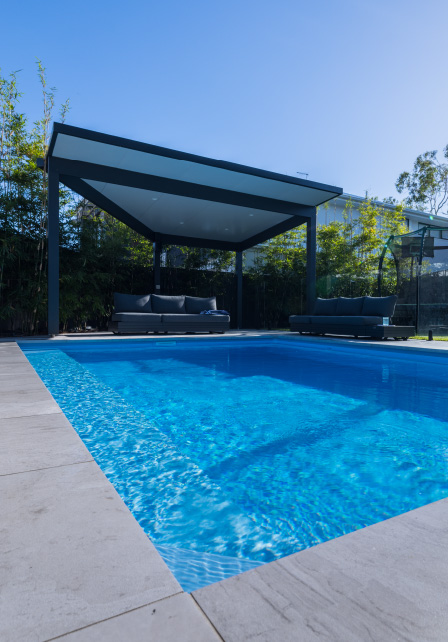
Health and Safety
Skin and Eye Irritation
- Saltwater Pools: Generally gentler on the skin and eyes, reducing irritation compared to chlorinated pools.
- Mineral Pools: Known for their therapeutic benefits, mineral pools can help soothe skin conditions and relax muscles.
- Chlorinated Pools: Traditional chlorine can cause skin and eye irritation, especially if levels are not correctly maintained.
- Freshwater Pools: Often the best for avoiding irritation, as there are no added chemicals in the water.
Health Benefits
- Saltwater Pools: May help alleviate skin conditions like eczema due to the lower chlorine levels.
- Mineral Pools: The magnesium and potassium in the water can benefit overall skin health and muscle relaxation.
- Chlorinated Pools: Effective at killing bacteria and pathogens, ensuring a safe swimming environment.
- Freshwater Pools: Offer a natural swimming experience, reducing exposure to chemicals and potential allergens.
Aesthetics and Customisation
Visual Appeal
- Saltwater Pools: Crystal-clear water with a natural look, enhanced by gentle blue-green hues.
- Mineral Pools: Similar to saltwater pools, with the added aesthetic appeal of luxurious mineral-infused water.
- Chlorinated Pools: Clear and inviting, though the water can sometimes appear harsh due to high chlorine levels.
- Freshwater Pools: Pristine and natural, these pools offer a refreshing, chemical-free appearance.
Customization Options
- Saltwater Pools: Compatible with various designs and features, including waterfalls and LED lighting.
- Mineral Pools: Allow for similar customisations as saltwater pools, making them versatile for different styles.
- Chlorinated Pools: Highly customisable, from shapes and sizes to additional features like slides or diving boards.
- Freshwater Pools: Customisable but may require specific filtration systems to accommodate certain designs.
Conclusion
Choosing the right pool type for your home involves considering various factors, from cost and maintenance to environmental impact and health benefits. Saltwater pools offer a gentle and low-maintenance option, while mineral pools provide therapeutic advantages. Chlorinated pools are effective and cost-efficient but can be harsher on the skin and eyes. Freshwater pools provide the most natural experience but require advanced filtration systems.
Ultimately, the best pool type depends on your specific needs, preferences, and budget. For those looking to invest in their home’s outdoor oasis, understanding these differences is the first step towards making an informed decision.


